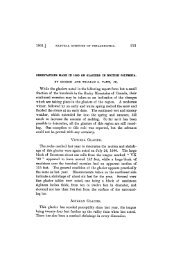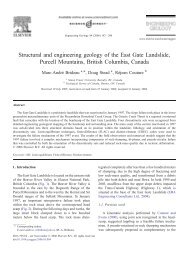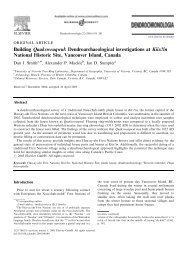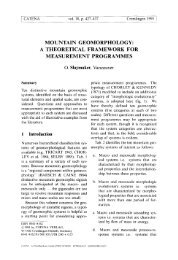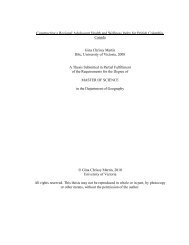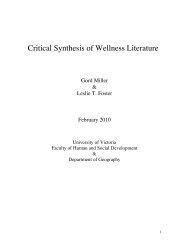Sustainable Food Production, Consumption, and the Generation of
Sustainable Food Production, Consumption, and the Generation of
Sustainable Food Production, Consumption, and the Generation of
Create successful ePaper yourself
Turn your PDF publications into a flip-book with our unique Google optimized e-Paper software.
This focus on pr<strong>of</strong>it is strongly supported by <strong>the</strong> major lobby groups involved in policy<br />
development. Agribusinesses <strong>and</strong> <strong>the</strong>ir associations play a large role in policy formation <strong>and</strong><br />
<strong>the</strong>ir influence is largely pr<strong>of</strong>it-oriented (McRae, 1999). Symptomatic <strong>of</strong> such involvement is <strong>the</strong><br />
general nature <strong>of</strong> <strong>the</strong> relationship between policy <strong>and</strong> consumer, which should be more protective<br />
<strong>of</strong> Canadians <strong>and</strong> less supportive <strong>of</strong> industry (Lang, 1997; McRae, 1999). Even so, policy at <strong>the</strong><br />
national level is not specifically designed to address problems <strong>of</strong> food security or social justice<br />
within <strong>the</strong> food system, but is instead narrowly focused upon specific commodities, highly<br />
flexible labelling regulations or drug laws (McRae, 1997; 1999; Lang, 1997). While it is<br />
necessary to be explicit about specific st<strong>and</strong>ards <strong>of</strong> production <strong>and</strong> nutrition, it should also be a<br />
priority <strong>of</strong> institutions such as Health Canada <strong>and</strong> Agriculture <strong>and</strong> Agri-<strong>Food</strong> Canada to<br />
encourage more socially responsible agribusiness activity through policy implementation<br />
(McRae, 1999).<br />
These same issues <strong>and</strong> criticisms are mirrored at <strong>the</strong> provincial level, albeit provincial<br />
ministries have a different m<strong>and</strong>ate than does <strong>the</strong> federal government. The provincial ministries<br />
are focused more upon agricultural development, production <strong>and</strong> trade within <strong>and</strong> between<br />
provinces, but still with <strong>the</strong> goal <strong>of</strong> optimizing <strong>the</strong> economic value <strong>of</strong> <strong>the</strong> sector (McRae, 1999).<br />
The British Columbia Ministry <strong>of</strong> Agriculture, <strong>Food</strong> <strong>and</strong> Forestry (MAFF) states that it “is<br />
committed to providing <strong>the</strong> business climate for a competitive <strong>and</strong> pr<strong>of</strong>itable industry providing<br />
safe, high quality food for consumers <strong>and</strong> export markets” (MAFF, 2005).<br />
Similar to <strong>the</strong> federal government, <strong>the</strong> focus <strong>of</strong> provincial ministries has been on agricultural<br />
production <strong>and</strong> <strong>the</strong> economic value <strong>of</strong> <strong>the</strong> industry. Therefore, lately <strong>the</strong>re has been an interest in<br />
restructuring federal <strong>and</strong> provincial ministries to create new policy frameworks <strong>and</strong> m<strong>and</strong>ates<br />
that would allocate more policy attention to food security issues (Koc <strong>and</strong> Dahlberg, 1999).<br />
McRae <strong>and</strong> <strong>the</strong> Toronto <strong>Food</strong> Policy Council (1999) <strong>of</strong>fer a model for restructuring provincial<br />
ministries to create a new ministry <strong>of</strong> food <strong>and</strong> food security that would switch <strong>the</strong> focus <strong>of</strong><br />
provincial agricultural policy away from agribusiness towards food security <strong>and</strong> sustainable<br />
development. Though <strong>the</strong>ir plan proceeds with “an evolutionary transition to <strong>the</strong> new approach,”<br />
<strong>the</strong>y acknowledge that such change would take time <strong>and</strong> patience to implement (McRae, 1999:<br />
198).<br />
In <strong>the</strong> mean time, one <strong>of</strong> <strong>the</strong> most effective ways to create positive change in food<br />
security issues seems to be at <strong>the</strong> local <strong>and</strong> urban levels. There is an increasing amount <strong>of</strong> work<br />
being done on policy implementation <strong>and</strong> sustainable development that is aimed at<br />
improvements on <strong>the</strong> municipal scale (Ellis <strong>and</strong> Sumberg, 1998; Berke, 2002). Various strategies<br />
34




